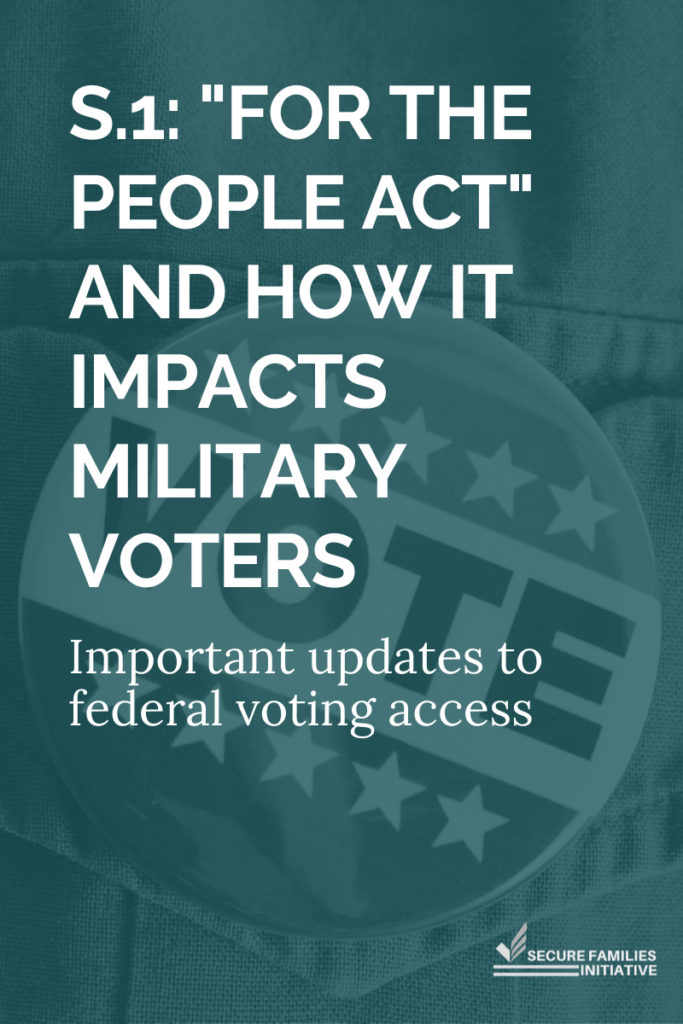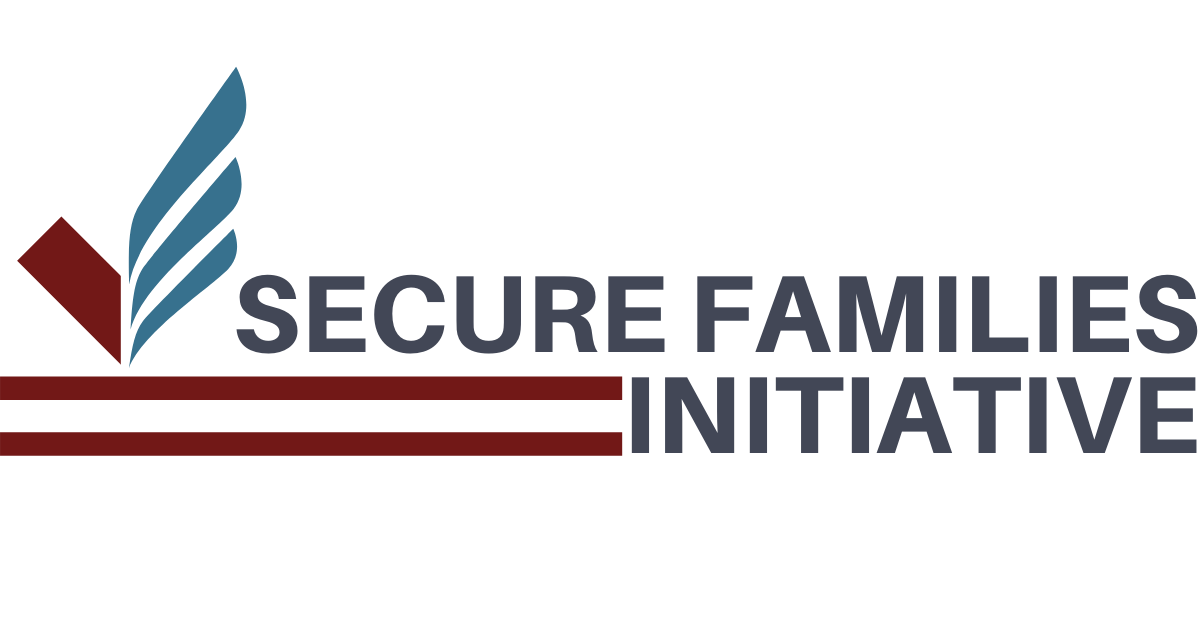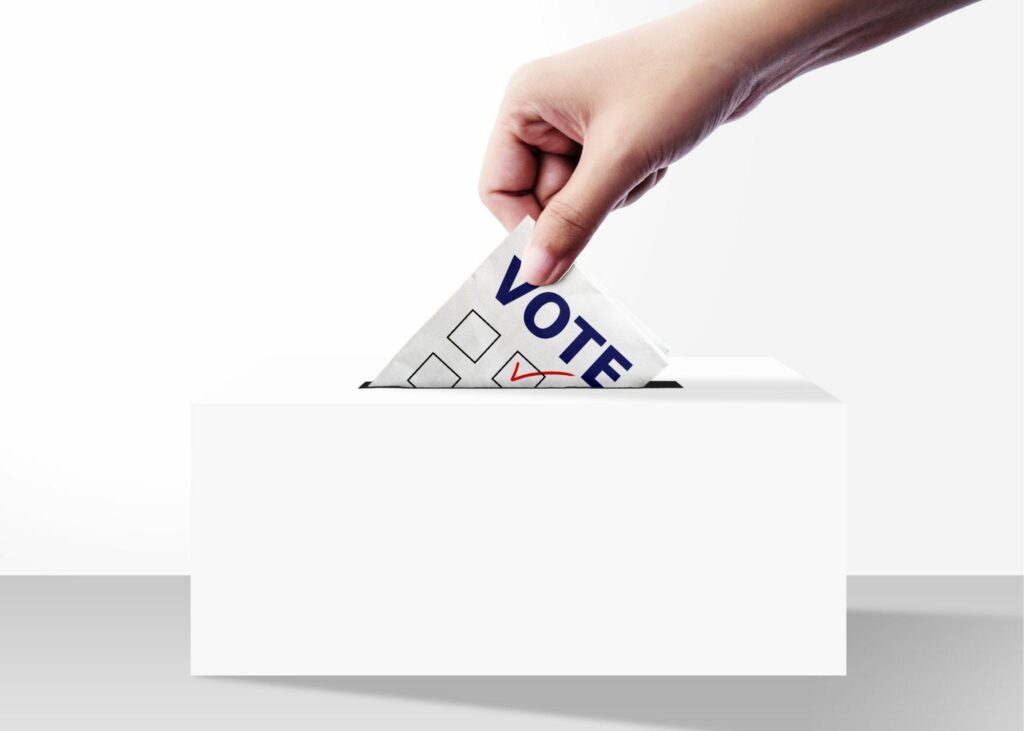The “For the People Act” passed the U.S. House of Representatives earlier this year and will now get a vote in the Senate later this month. This historic legislation would make it easier for all Americans to vote and includes a number of important updates to federal voting access for military voters.
We know firsthand that our community faces increased barriers to voting. That’s why we’re eager to support this bill. Here’s a closer look at the provisions that are most relevant to our community, and an opportunity for advocates to join us in supporting it through the Senate!
For the People Act: Title 1, Subtitle J — Absent Uniformed Services Voters and Overseas Voters
According to the Brennan Center for Justice, Title 1 broadly “aims to modernize voter registration and take other steps to improve voting access in federal elections.” Subtitle J focuses on military voters in particular.
UOCAVA Deadline to Mail Ballots
Current law requires state and local election officials to send ballots to military and overseas voters at least 45 days prior to Election Day. H.R.1 reinforces this policy by creating incentives for states to comply, and consequences if they do not.
For example, If states fail to send absentee ballots to military and overseas voters on time, this bill requires states to use and pay for express delivery and return of ballots. The goal is to ensure voters have the maximum amount of time to review and return their ballots before Election Day deadlines.
State Residency Guarantee
“For the People Act” extends the guarantee of state residency for voting purposes to all spouses and dependents of absent servicemembers. The current law called Military Spouse Residency Relief Act (MSRRA) provides protection to military spouses related to residency, voting, and taxes. However, there is a loophole where spouses and dependents who are not accompanying their service member (for example, if they’re “geo-baching” or living with family while their loved one is deployed) don’t have the same residency guarantees. This bill closes that loophole.
Right to Sue
This bill establishes a cause of action for UOCAVA voters to sue as a private litigant. In simpler words, military and overseas voters can now sue a state for violating their right to vote. (Currently, only the Attorney General is allowed to bring legal action on behalf of absentee military voters.)
Election Reporting to Congress
States will be required to submit pre- and post-election reports to Congress detailing the number of absentee military and overseas ballots they sent out, and how many were returned. This data will be hugely helpful to advocates like us as we track voter participation rates.
Other Military-Specific Provisions
In Part 2 “Automatic Voter Registration,” the bill lists the Defense Manpower Data Center at DoD as one of the federal agencies that will help register voters. If passed, this language means that advocates like us will have the opportunity to shape an opt-out voter registration system for active duty service members — a huge step that could help boost voter registration!
During the Senate Rules Committee markup, two amendments passed unanimously to protect electronic voting methods currently available to military voters in 30 states. These amendments fixed a gap that existing in the House version of the bill, H.R.1.
What’s next?
The Senate must now consider its version of the “For The People Act,” S.1. This will be an uphill battle, and we need all hands on deck if we want this bill to pass. Can you help us spread the word?
Write a Letter to the Editor
A Letter to the Editor (LTE) is a quick blurb that newspapers publish to give a snapshot of life from a member of the community. It provides a personal perspective on broad, difficult issues. A strong LTE on the local level can be persuasive and reach people in a way that traditional news stories and national pundits never will.
Step 1: Decide where you want to submit your letter. Your best bet will be picking a local news outlet where you either live or vote.
Step 2: Look them up online. Every news outlet is different, so once you’ve identified your target outlet, check out their website for submission instructions and word count.
Step 3: Prep your letter. Our volunteer drafted two LTE templates below to make it easy. You can customize the tone and add your own personality!
Step 4: Send and wait! Reach out to us if we can help.
Template 1
Military families like mine enthusiastically support the “For the People Act” now before the Senate. Between overseas posts and frequent moves, military families face increased barriers to voting. The “For the People Act” addresses those with improvements like improving state compliance in sending on-time absentee ballots, closing the loophole on state residency for spouses and dependents of absent servicemembers, and allowing military members legal recourse if a state violates their right to vote. It also addresses a new national security front, cyber assaults on election integrity, by increasing oversight, expanding voter machine and poll book testing, and requiring hand marked paper ballots in every jurisdiction. Support military families across the country by calling the Senate switchboard at 1-202-224-3121 and tell your Senator: “Vote Yes on the For the People Act.”
Template 2
You thank military families for our service—now’s your chance to look out for us! Call the Senate switchboard at 1-202-224-3121 and ask your Senator to vote “YES” on the For the People Act, which protects military voters by ensuring our votes are counted. It closes complicated residency loopholes for spouses and dependents, adds accountability measures so we receive our absentee ballots on time, and fights against cyber assaults on our democracy. Thank you for supporting military voting rights with the For the People Act, and also those of your fellow citizens.


